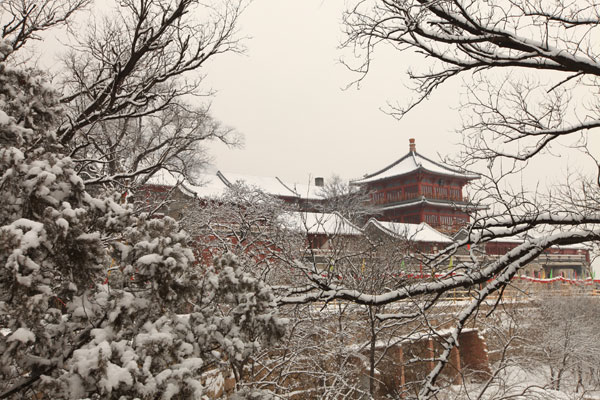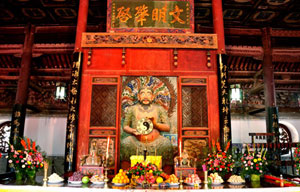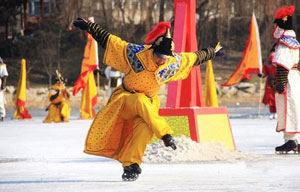Peace of mind
Updated: 2013-02-04 10:47
By Harvey Dzodin (China Daily)
|
||||||||
 |
|
Longquan Monastery is an oasis of peace, beauty and tranquility. Provided to China Daily |

Longquan Monastery is just an hour away from downtown Beijing, but Harvey Dzodin discovers it's a breath of fresh air.
Beijing is a city of hidden treasures. There's a lot more to it than the Forbidden City and the Silk Market but sometimes you have to make an effort to scratch beneath the surface or be lucky enough to stumble onto something of great value.
Pardon me for mixing religious metaphors, but I had an epiphany recently when I visited the ancient Longquan Monastery in the wilds of Haidian district, abutting the Phoenix Ridge, beyond the northwest Sixth Ring Road.
With historic remnants of more than a millennium, Longquan is definitely worth a visit, especially for the upcoming Spring Festival.
Many of the monks there attended the best universities in China but gave up distinguished careers to devote themselves to a pure life. There is also an abbot who uses the Internet and social media to spread Buddhism's venerable eternal values in a multitude of languages.
Beijing is blessed to be surrounded by rugged mountains, although we can only see them from afar a handful of days each year. From central Beijing and with no traffic, Longquan is only an hour away, but it is worlds away in terms of peace, beauty and tranquility.
Entering the grounds, one encounters the 1,000-year-old Golden Dragon bridge, which has stood there since AD 951. It was built by Longquan's first abbot, Venerable Master Jisheng, who spent three years collecting alms from believers to realize its construction.
The bridge is one of the largest and oldest single-arch stone bridges in Beijing. According to legend, a golden snake lives in the stream beneath it.
Nearby, there is a giant gingko tree, also dating back to the Liao Dynasty (916-1125).
Local lore has it that a white-bearded old man seen frequently wandering there was the god of this tree. A short, easy climb up the mountain are the haunting remains of an equally venerable nunnery. Women associated with the imperial court were sent here in service to Buddhism.
Although both moving and interesting, a place like Longquan is not about its physical attributes but about its beliefs and activities.
These are embodied by the monks and others who live a strict monastic life there, and their spiritual leader who guides them.
Master Xianyu won the Gold Medal of the International Mathematics Olympiad while still a high school student. He became a monk after graduating from Peking University.
So as not to be disturbed in the cause of advancing his mind, he chose a monastic life to benefit others.
Another of his colleagues with a PhD from Tsinghua University, Master Xianqi says he joined Longquan to "do the most needed work of our time, that is, to practice and promote Buddhist culture"
The abbot of Longquan is the internationally recognized Venerable Master Xuecheng, who holds many leadership positions at home and abroad.
He also serves as the abbot of the monasteries in Guanghua in Fujian province and Famen in Shaanxi province.
While the Buddhism practiced by Master Xuecheng and his disciples is more than two millennia old, I was astonished to see banks of state-of-the-art computers, a media studio and a modern library at Longquan.
Those who practice this ancient religion at Longquan have embraced the Internet, including multilingual modern social media and websites.
This is in keeping with the abbot's vision for Longquan to be a contemporary Dharma-proclaiming monastery promoting "the possible combination of Buddhist tradition and modern civilization".
The monastery is open to the public without charge. On weekends, there are Dharma study classes of the principle of cosmic order in several languages and on some weekends, celebrated scholars and scientists are invited to give lectures.
For the upcoming Lunar New Year, a 10-day multilingual Dharma Assembly will be held with chanting in Chinese and English, as well as several other tongues.
Attendance, meals (with much of the food grown organically on-site) and lodging, are free of charge.
On Lunar New Year's eve, Feb 9, Longquan will have a party with original performances given by volunteers. On the 15th day of the first lunar month, Feb 24, the Lantern Festival, Longquan will be lit up with lanterns of various designs and many events have been planned.
Contact the writer at sundayed@chinadaily.com.cn.
|
 |
 Chinese-stylecarnival! Guides for Snake Year temple fairs in Beijing |

 'Taken 2' grabs movie box office crown
'Taken 2' grabs movie box office crown
 Rihanna's 'Diamonds' tops UK pop chart
Rihanna's 'Diamonds' tops UK pop chart
 Fans get look at vintage Rolling Stones
Fans get look at vintage Rolling Stones
 Celebrities attend Power of Women event
Celebrities attend Power of Women event
 Ang Lee breaks 'every rule' to make unlikely new Life of Pi film
Ang Lee breaks 'every rule' to make unlikely new Life of Pi film
 Rihanna almost thrown out of nightclub
Rihanna almost thrown out of nightclub
 'Dark Knight' wins weekend box office
'Dark Knight' wins weekend box office
 'Total Recall' stars gather in Beverly Hills
'Total Recall' stars gather in Beverly Hills
Most Viewed
Editor's Picks

|

|

|

|

|

|
Today's Top News
Boston bombing suspect reported cornered on boat
7.0-magnitude quake hits Sichuan
Cross-talk artist helps to spread the word
'Green' awareness levels drop in Beijing
Palace Museum spruces up
First couple on Time's list of most influential
H7N9 flu transmission studied
Trading channels 'need to broaden'
US Weekly

|

|








